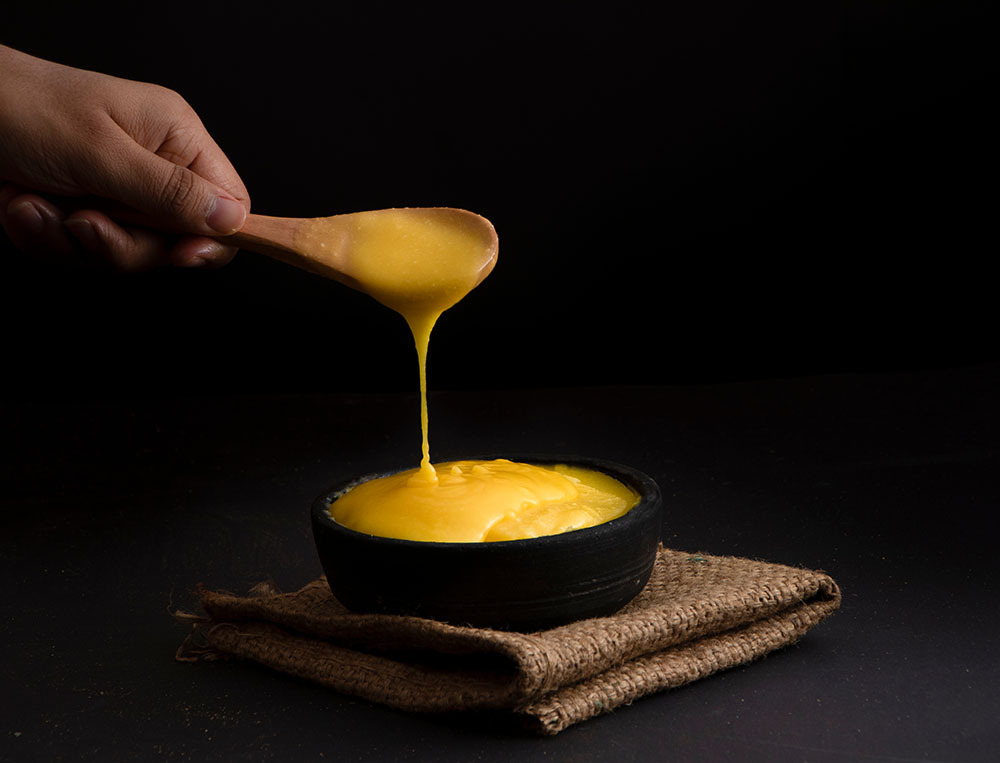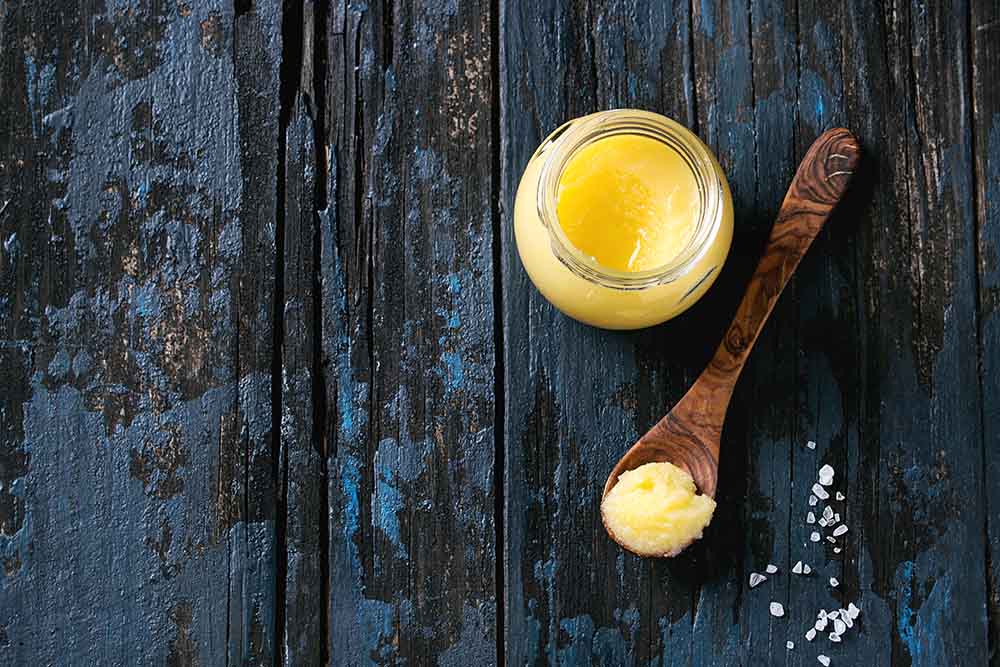It has been said that ghee is the ’food of life’. The traditional way of making it is by slowly simmering butter and removing the impurities in it. As a result, all kinds of milk solids form, which are then skimmed off and the pure butter fat is preserved. There are many health benefits of ghee that are very well known in India, but a lot of people may not be aware of it.
Nutritional Benefits of Ghee
One of the health benefits of ghee is that it is very good for the heart and circulatory system. When we consume ghee, it provides us with a significant amount of iron. The iron in ghee can also be easily absorbed by the body. In addition, it has an excellent effect on cholesterol levels. It can also help prevent other diseases associated with high cholesterol.
Ghee is rich in vitamins A, B1, B12 and also C. It contains almost all the minerals that are essential for the body and is high in phosphorus, magnesium and potassium.
Precautions When Consuming Ghee
People with high blood pressure should avoid consuming ghee as it increases the level of cholesterol and triglycerides in their blood. These two are associated with heart disease. Although ghee does contain some saturated fat by itself, it does not contain trans fat (saturated fat doesn't have trans fats in them). So, there is no need to worry about consuming ghee. To avoid heart disease, people with high blood pressure should consume ghee infrequently.
People with diabetes should also avoid consuming ghee as it could increase their blood sugar level, which may lead to serious health problems. People who have any kind of digestive problems should not consume ghee as it can cause an upset stomach or diarrhoea.
Ghee is very high in calories, and because of this it should not be consumed in excess otherwise it can cause weight gain and obesity.

Let us look at some of these health benefits of ghee:
1. Prevents Cancer
Consumption of ghee regularly can prevent cancer and can be used as a food during chemotherapy also, since it provides all the essential fatty acids and supports resistance to infections. Regular use of ghee acts as an antioxidant and boosts the immune system and hence, helps to prevent cancer and infections.
2. Prevents Diabetes
Ghee can be consumed as part of a healthy diet. It has been found that people who consume ghee regularly are less likely to have diabetes than those who do not consume it.
It also protects from heart disease and stroke. Ghee is high in saturated fat, but it does not have trans fat in it and hence, does not cause any health problems. Ghee can be used as a substitute for butter or lard in cooking by people who are trying to lower their cholesterol level or lose weight.
3. Promotes Hair Growth
Promotes hair growth and prevents loss of hair.
4. Prevents Constipation
Regular consumption of ghee helps to keep the digestive system in good condition. It improves the regularity of bowel movements and also helps to prevent constipation.
5. Boosts Energy Levels
Ghee is a rich source of antioxidants that fight free radicals and various types of viruses and bacteria (pincer). In addition, ghee has an excellent effect on cholesterol levels. It can also help to prevent other diseases associated with high cholesterol.
The antioxidants present in ghee work by keeping free radicals at bay, while they improve your body's ability to use glucose efficiently, therefore reducing the risk of diabetes. Ghee makes you feel more energetic, especially after eating or just after waking up in the morning..
6. Controls Cholesterol
Ghee contains conjugated linoleic acids (CLA), which are highly effective in controlling cholesterol. It lowers LDL (bad) cholesterol and raises HDL (good) cholesterol levels. It helps to keep the blood vessels clean from any fat deposit or plaque formation, thus preventing heart attack or stroke down the line.
Ghee is a very good source of linoleic acid, which works as a powerful weapon against high cholesterol (LDL cholesterol). In addition, ghee is also very high in polyunsaturated fats like omega-3 and omega-6, which work as strong antioxidants and help to prevent high cholesterol from forming in the body.
7. Source of Micronutrients
Ghee is rich in vitamins A, B1, B12 and C. Ghee contains almost all the minerals that are essential for the body. It is high in phosphorus, magnesium and potassium. Ghee can be used as a part of a healthy diet. This is also one of the great health benefits of ghee.
8. Prevents Acne
Ghee can be applied to the face for the prevention of acne. It moisturises your skin, preventing blackheads and whiteheads. The vitamin E present in ghee helps to repair damaged skin tissue, resulting in smooth and clear skin.
9. Strengthens Bones
Ghee can help to strengthen bones by providing calcium. The fatty acids present in ghee can also reduce the risk of osteoporosis and various types of arthritis. Ghee can promote bone health by providing calcium and magnesium, two minerals that are essential for bone development. Ghee also contains high concentrations of zinc, which are required for healthy bones. Ghee is known to improve health of bones in your feet, strengthen teeth and aid in swallowing since it reduces swelling of the throat muscles.
10. Cleanses the Body
Consumption of ghee helps to cleanse the body from toxins and impurities, providing relief from skin infections.
11. Strengthens the Immune System
Consumption of ghee helps to strengthen the immune system. The antioxidants present in ghee help to keep your body healthy. Ghee can help strengthen the immune system, preventing various diseases from affecting your body and makes one feel more energetic. Ghee helps to maintain good digestion and ensures better muscle strength and stamina.
12. Aids the Digestive System
Ghee can help to improve digestion by providing nourishment to the skin and other parts of the body.
13. Protects the Heart
Ghee helps to maintain a healthy heart by lowering blood pressure, keeping blood sugar levels normal and protecting the heart from free radicals. It also helps to fight off infections that may cause problems in your heart.
14. Prevents Skin Dyhydration
Ghee can be used as a moisturiser for the skin, which prevent the skin from dryness and loss of elasticity.
15. Maintains the Immune System
Consumption of ghee helps to keep the immune system strong and healthy. It helps to fight off infections that may cause problems in your body.
16. Prevents Kidney Stones
Consumption of ghee is found to be effective in preventing kidney stones. It has been found that people who consume ghee regularly have a lower risk of developing kidney stones.

Sources of Ghee
Ghee is made from butter, which is heated at a very low temperature for several hours. However, it needs to be cooked on medium heat for a few minutes before it is used for medicinal purposes (as per Ayurveda). If you are not able to find fresh and pure ghee at your local market then you can always make it at home.
Conclusion
Since ghee is made from butter it also has a certain amount of lactose in it. Therefore, people who are lactose intolerance should avoid ghee. Pregnant women should avoid consuming ghee. In Ayurvedic medicine, pregnant women are advised to avoid eating ghee due to the presence of hormones in it. The type of cow's milk used to produce the butter could affect its nutritional value.
Ghee that is produced from cow's milk from A2-type cows will be healthier than the one that is produced from A1-type cows (which most milk and dairy products are). So instead of using commercially available ghee you can make your own at home and enjoy the benefits without any side effects.
FAQs
Are there any health benefits of ghee and why?
Ghee is very healthy and good for the health. It ensures that your body gets all the goodness it needs to remain healthy. As mentioned earlier, ghee is used in Ayurveda as a kind of medicine, which offers great health benefits.
What is the difference between ghee and clarified butter?
There are many differences between clarified butter and ghee. While both of them are essentially made from butter, the method of producing them differs. Whereas clarified butter is naturally obtained by simmering butter in a pan, ghee is obtained by slow heating (over low heat) of unsalted butter until all water evaporates and there's only fat left.
How do you make ghee at home?
The traditional way of making ghee at home is by slowly simmering butter and removing the impurities in it.